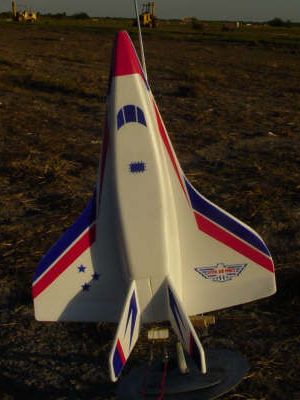Estes Air Show Launch Set
Estes - Air Show Launch Set {Launch/Starter Set}
Contributed by Donald Besaw Jr
| Construction Rating: | starstarstarstarstar_border |
| Flight Rating: | starstarstarstarstar |
| Overall Rating: | starstarstarstarstar_border |
| Manufacturer: | Estes  |

Brief:
This is a launch set containing a Porta Pad II launch pad, an Electron Beam
launch controller, and a 1/8 inch launch rod. No motors are included with this
set. The rocket included in this set consists of two large (12 inch wingspan)
foam gliders that glide back and a power pod that recovers on a 12 inch
parachute.
Construction:
The model consisted of:
- 2 foam gliders and vertical fin assemblies
- 2 blocks of nose weight for gliders
- 1 spacer tube
- 1 motor mount tube
- 1 motor hook
- 1 motor block
- 3 centering rings
- 1 shock cord
- 1 12 inch parachute
The instructions included in the set were very complete and had lots of great illustrations and text. Since the gliders are foam, no construction was necessary except for gluing the vertical fin assemblies in place which I did with white glue. The power pod requires some assembly which consisted in assembling the motor mount and installing it into the body tube, then the shock cord mount is assembled and mounted into the body tube. The parachute is tied to the shock cord to finish the assembly.
I then test fit the gliders to the power pod. I had to slightly trim the foam at the attachment point of one glider to obtain a snug but not too tight fit to the pod. Both of my gliders only required half a block of nose weight each to obtain the desired glide profile.
PROs: No glider construction required, minimal power pod assembly required, it is assembled quickly and easily.
CONs: Glider fit was rather tight at first but is easily fixed.
Finishing:
Since the gliders are precolored and the power pod is left as is, no finishing
is required. No decals are included as the gliders look very sharp in their
red, white, and blue color schemes.
PROs: No finishing required.
CONs: None.
Construction Rating: 4 out of 5
Flight:
The reccommended motors for this rocket are the B6-2 and the C6-3. Due to the
weight of this model, nearly 5 ounces, I would stick with the short delays.
The model is prepped by inserting the motor into the motor mount and inserting some wadding into the body tube. The parachute is then inserted into the tube and the gliders are then attached to the power pod.
My first flight was on a B6-2. The stack lifted off rather slowly and arced gently into the breeze and reached about 110-120 feet, arced over, and released the gliders which descended in nice slow circles.
The second flight was on another B6-2. This time the stack flew straight up and released the gliders right at apogee.
The third flight was on a C6-3. This is the ideal motor for this model. The stack lifted off, went straight up to about 300 feet and released the gliders just past apogee. Both gliders glided down in big slow circles around the launch site while the pod returned on its 12 inch parachute.
PROs: Flies great, awesome glider performance.
CONs: None.
Recovery:
This model uses glide and parachute recovery. Once released, the gliders glide
down in big slow circles and the power pod comes down nicely on a 12 inch
parachute.
I was really impressed that the gliders performed very well with a minimal amount of trimming.
PROs: Great glide and parachute recovery.
CONS: None.
Flight Rating: 5 out of 5
Summary:
I really liked this set. This is a great flying and very stable glider
configuration. If you are looking to get started with rocket launched gliders
or just like gliders, this is a set you might want to try.
At about $29.99 from Wal-Mart, the price might seem a bit steep for what you get but I feel the performance was well worth the price.
Main PROs: Minimal construction of power pod, no real assembly required for gliders, excellent flight and glide performance.
Main CONs: Slight trimming required for pod fit, high price.
Overall Rating: 4 out of 5
 |
 |
Flights
 |
 |
Sponsored Ads
 |
 |












D.J.B. (September 21, 2008)